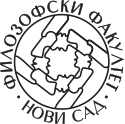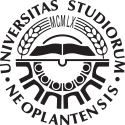15MKMK062 - Psycholinguistics
| Course specification | ||||
|---|---|---|---|---|
| Course title | Psycholinguistics | |||
| Acronym | 15MKMK062 | |||
| Study programme | Hungarian language and literature | |||
| Module | ||||
| Type of study | first degree undergraduate academic studies | |||
| Lecturer (for classes) | ||||
| Lecturer/Associate (for practice) | ||||
| Lecturer/Associate (for OTC) | ||||
| ESPB | 3.0 | Status | ||
| Condition | No prerequisite | Oblik uslovljenosti | ||
| The goal | Students are introduced to the general theoretical directions and research results of psycholinguistics as an interdisciplinary science, which are sourced from the theoretical, empirical and research experiences found in the common domain of psychology, linguistics and information theory. | |||
| The outcome | Students will display newly gained knowledge, based on previous familiarity with psychology and general linguistics, of the conceptual and terminological apparatus of psycholinguistics by virtue of which they will be able to understand the neurological processes that conduct speech production and perception. Students will also gain insight into the mechanisms of various language disorders. | |||
| Contents | ||||
| Contents of lectures | Psycholinguistics as a scientific discipline. The brain as the neurological center of mental activities. Mental lexicon. Speech production, basic models, spontaneous speech. Speech perception, utterance, words, written words. Anomalies and deviations in language acquisition and speech production. The process of mother tongue acquisition. Second language acquisition. Bilingualism. | |||
| Contents of exercises | Discussions on the topics covered in the theoretical content, presentations of research on various topics, independent students’ presentations on certain thematic units. | |||
| Literature | ||||
| ||||
| Number of hours per week during the semester/trimester/year | ||||
| Lectures | Exercises | OTC | Study and Research | Other classes |
| 1 | 1 | |||
| Methods of teaching | Mixed interactive teaching types: developing experimental-analytical projects, discussions etc. | |||
| Knowledge score (maximum points 100) | ||||
| Pre obligations | Points | Final exam | Points | |
| Activites during lectures | 10 | Test paper | ||
| Practical lessons | 10 | Oral examination | 50 | |
| Projects | 15 | |||
| Colloquia | 15 | |||
| Seminars | ||||

